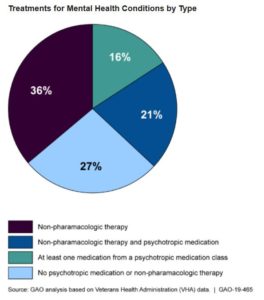 WASHINGTON — Even as VA facilities open up nationwide, administrators and others are keeping a wary eye on the possibility of a significant second wave of the COVID-19 pandemic in the fall. U.S. healthcare systems are preparing now for a sharp increase in cases in the coming months and evaluating potential changes in care delivery for many conditions, including severe mental illness.
WASHINGTON — Even as VA facilities open up nationwide, administrators and others are keeping a wary eye on the possibility of a significant second wave of the COVID-19 pandemic in the fall. U.S. healthcare systems are preparing now for a sharp increase in cases in the coming months and evaluating potential changes in care delivery for many conditions, including severe mental illness.
Use of long-acting injectables for severe mental illness was among the treatments that providers debated continuing or changing when COVID-19 first hit the country in the spring. Health systems had to weigh the risk of inpatient visits for injections against continuity of care and higher rates of adherence.
New guidelines issued by the American Psychiatric Association (APA) on September 1 comes out in favor of long-acting injectables (LAI) for patients who “prefer such treatment or if they have a history of poor or uncertain adherence.”1
In the best of times, poor or uncertain adherence is a significant issue for veterans with severe mental illness, who may have trouble taking daily medications because of homelessness, cognitive deficits or disorganization related to their illness, or because they do not think they are unwell, regardless of the disruption the disease creates in their life.
As the VA looks to provide quality care to some of the most vulnerable veterans, challenges of the current environment and potential deterioration in the autumn must be considered.
An earlier COVID-19 pandemic guidance document issued by the APA addressed LAI specifically in the context of lockdown conditions. “In the current COVID-19 pandemic, it has been reported that the administration of LAI has been suspended in some areas due to it being considered an elective procedure. However, the role of LAI is a clinically necessary treatment and should be continued for patients with chronic mental illness.”
Continue Reading this Article: Stabilizing Treatment

